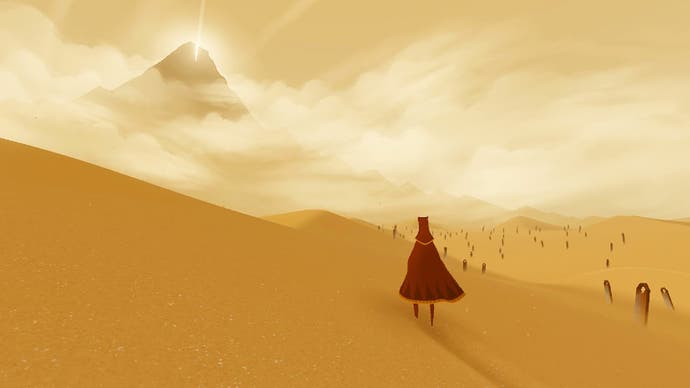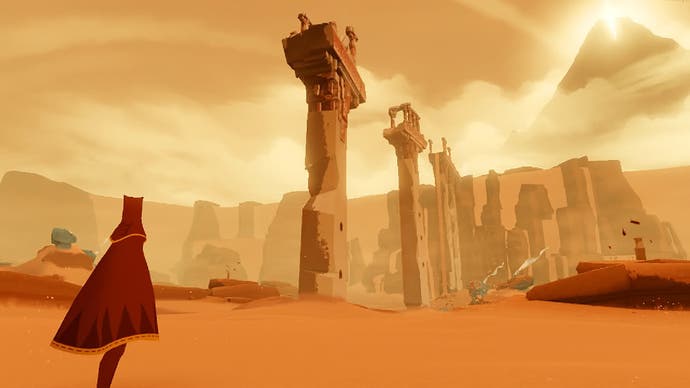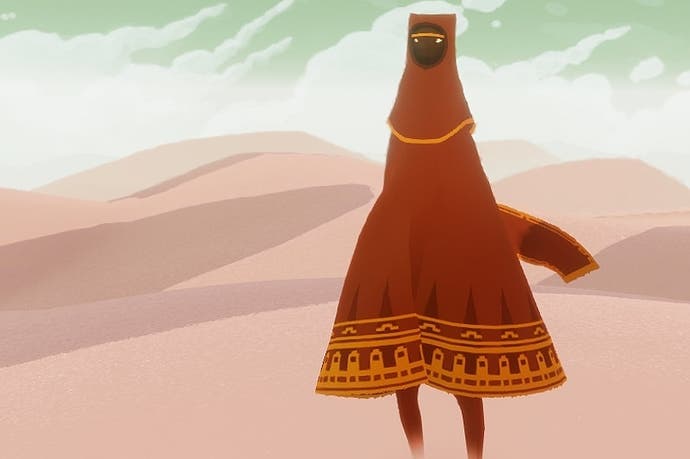Games of the Generation: Journey
Don't stop believing.
Over the next two weeks we'll be bringing you our pick of the games of the generation. Today we're looking at Journey, thatgamecompany's slight PlayStation 3 exclusive that won instant critical acclaim when it launched last year.
One of the gentle tragedies of this generation has been the absence of one of the masters of the last. Whatever calamities have befallen the small corner of Sony Japan's headquarters that is home to Team Ico has robbed the past eight years of the ethereal ambiguity that Fumito Ueda explored in his brace of PlayStation 2 games. It's an absence that's been keenly felt, too - just ask Sony's Worldwide Studios boss Shuhei Yoshida. Actually, don't - it's a question he's been fielding in every interview since the dawn of PlayStation 3.
Yet while everyone was waiting for the second coming of The Last Guardian's catweagle, a small team in Los Angeles quietly picked up the baton from Team Ico and took it to some fascinating places. When Kellee Santiago and Jenova Chen came together at the University of South California to found a development studio, Shadow of the Colossus was stomping its way to critical acclaim amidst the dying embers of the PlayStation 2. Under a year later, thatgamecompany was making an understated debut on PlayStation 3 with Flow.
Its immediate follow-up, Flower, was just as unassuming and just as stylish, and on its gentle breeze was the faintest tell of what was to come. Both Flow and Flower had a confidence in their minimalism, and a desire to keep things simple. The studio's next project, which would be three years in the making, took that simplicity to a grander stage.

Journey's a game defined as much by what it isn't as what it is. In an era where the appetites of hungry audiences are satiated by companies tossing out swill buckets overflowing with content, there's a certain defiant charm in the 90 minutes it takes to see Journey through to its end. At a time when so many players define themselves by their conquests and achievements, there's something too in its obstinate refusal to raise a challenge.
And at a time when so many games strive for nothing more than provoking the thrill of victory, Journey's ambition marked it out. It started life, as not nearly enough video games do, the result of a conversation with an astronaut, who told Chen of the sense of spirituality that overcomes those fortunate few who have set foot on the moon. It's a feeling that swells, as several have told, when faced with the relative obscureness of existence, and with being able to hold out a single thumb and cover the entirety of the planet Earth. It's a moment probably not best soundtracked by the ping of a fresh achievement: Trophy Unlocked! You've Realised Your Own Insignificance.
Chen and thatgamecompany evoke that sublime extraterrestrial moment by using a tool too often unused: silence. It's one that Team Ico once knew well how to wield; think of the echoing spaces between Ico's grand and strange structures, or of the emptiness that blows across Shadow of the Colossus' epic prairies. In Journey, it's a silence that whistles across sand dunes and through abandoned towers, and one that rebounds upon the enigmatic murals you stumble across on your travels.
It's also a silence that extends, most brilliantly, to its online vision. Co-operative partners are graciously dropped into the game, their appearance ageless, sexless and, most importantly, mute. Stripped of such vestiges, it makes for a connection perhaps more profound than any other online game has managed. "'People will venture out to the height of the mountain to seek for wonder,'" Chen recited as he shared his love of third century philosopher Augustine over a burger with Simon Parkin. "'They will stand and stare at the width of the ocean to be filled with wonder. But they will pass one another in the street and feel nothing. Yet every individual is a miracle. How strange that nobody sees the wonder in one another.'" The best way to discover the wonder in one another, Journey suggests, is to shut us all the hell up.
"Early versions of the game included a hand-holding mechanic between players, building on Chen's vision of the perfect online experience being about helping others, and being helped, yet the most affecting connection ends up being the one made with no contact."

Journey's vision of co-op feels like a witty inverse of the simple rumbling tug that lent Ico so much of its emotional weight, yet it has much the same effect. Early versions of the game included a hand-holding mechanic between players, building on Chen's vision of the perfect online experience being about helping others, and being helped, yet the most affecting connection ends up being the one made with no contact. It's a fascinating quirk of design, the kind you wonder whether Team Ico may have ended up with had they applied their craft to online.
It's not a stubborn silence that Journey wields, though, and in spite of its grand ambitions it remains a resolutely playful game. That's told in the innocent chirps and tweeps of recently acquainted players, and in the steep and glistening dunes you surf down, lost in the joy of motion. It's told in the ecstasy of its jump, a move that must be earned and that sends you skywards in dizzyingly wide arcs.
Written in that arc, and in that playful moment of escape from gravity, lies Journey's theme of transcendence. It's a literal touch rather than a literary one, as thatgamecompany's reliance on the framework of the hero's journey provides a fittingly slight narrative thread - but here it's told through little beyond mechanics and systems. Journey proves in its epic minimalism that a tale told through the struggles and reliefs of a player with a controller can be just as powerful as that relayed through the spoken or written word.
And it's a refreshingly different tale that Journey sets out to tell. Its mesh of faiths and religions results in a strangely neutered brand of spirituality, but in the travels of its cloaked hero it manages to find between them a common thread that truly distinguishes thatgamecompany's achievement. When games have so often been about the adrenaline rush of escaping death, Journey is about no more or less than the melancholy triumph of embracing it.









